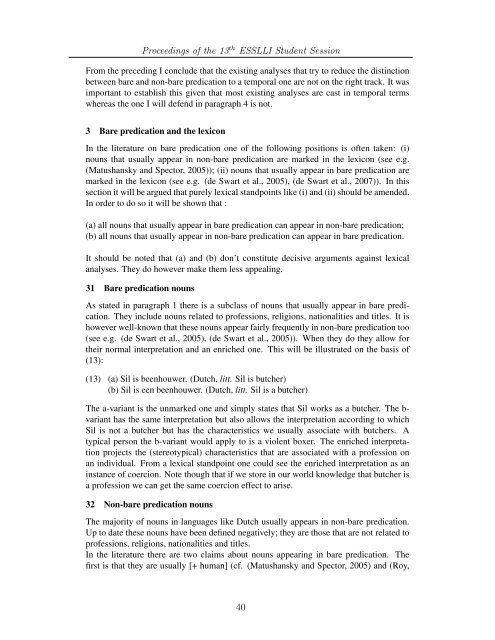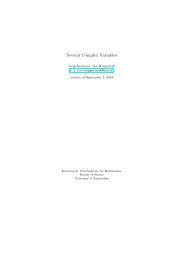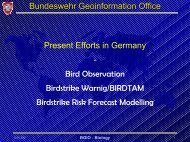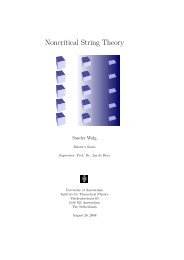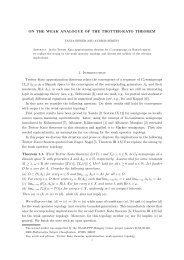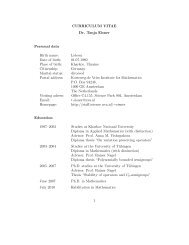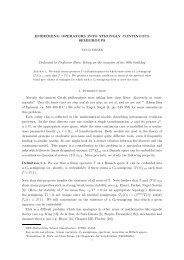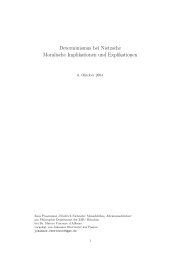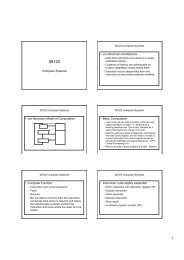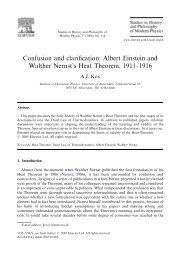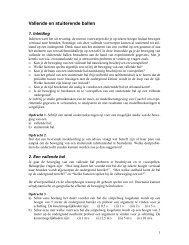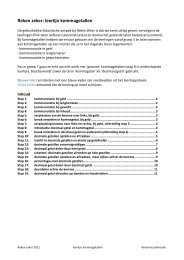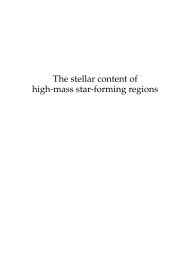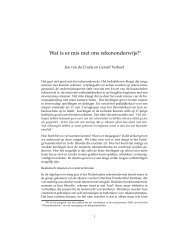Proceedings of the 13 ESSLLI Student Session - Multiple Choices ...
Proceedings of the 13 ESSLLI Student Session - Multiple Choices ...
Proceedings of the 13 ESSLLI Student Session - Multiple Choices ...
Create successful ePaper yourself
Turn your PDF publications into a flip-book with our unique Google optimized e-Paper software.
From <strong>the</strong> preceding I conclude that <strong>the</strong> existing analyses that try to reduce <strong>the</strong> distinction<br />
between bare and non-bare predication to a temporal one are not on <strong>the</strong> right track. It was<br />
important to establish this given that most existing analyses are cast in temporal terms<br />
whereas <strong>the</strong> one I will defend in paragraph 4 is not.<br />
3 Bare predication and <strong>the</strong> lexicon<br />
In <strong>the</strong> literature on bare predication one <strong>of</strong> <strong>the</strong> following positions is <strong>of</strong>ten taken: (i)<br />
nouns that usually appear in non-bare predication are marked in <strong>the</strong> lexicon (see e.g.<br />
(Matushansky and Spector, 2005)); (ii) nouns that usually appear in bare predication are<br />
marked in <strong>the</strong> lexicon (see e.g. (de Swart et al., 2005), (de Swart et al., 2007)). In this<br />
section it will be argued that purely lexical standpoints like (i) and (ii) should be amended.<br />
In order to do so it will be shown that :<br />
(a) all nouns that usually appear in bare predication can appear in non-bare predication;<br />
(b) all nouns that usually appear in non-bare predication can appear in bare predication.<br />
It should be noted that (a) and (b) don’t constitute decisive arguments against lexical<br />
analyses. They do however make <strong>the</strong>m less appealing.<br />
31 Bare predication nouns<br />
<strong>Proceedings</strong> <strong>of</strong> <strong>the</strong> <strong>13</strong> th <strong>ESSLLI</strong> <strong>Student</strong> <strong>Session</strong><br />
As stated in paragraph 1 <strong>the</strong>re is a subclass <strong>of</strong> nouns that usually appear in bare predication.<br />
They include nouns related to pr<strong>of</strong>essions, religions, nationalities and titles. It is<br />
however well-known that <strong>the</strong>se nouns appear fairly frequently in non-bare predication too<br />
(see e.g. (de Swart et al., 2005), (de Swart et al., 2005)). When <strong>the</strong>y do <strong>the</strong>y allow for<br />
<strong>the</strong>ir normal interpretation and an enriched one. This will be illustrated on <strong>the</strong> basis <strong>of</strong><br />
(<strong>13</strong>):<br />
(<strong>13</strong>) (a) Sil is beenhouwer. (Dutch, litt. Sil is butcher)<br />
(b) Sil is een beenhouwer. (Dutch, litt. Sil is a butcher)<br />
The a-variant is <strong>the</strong> unmarked one and simply states that Sil works as a butcher. The bvariant<br />
has <strong>the</strong> same interpretation but also allows <strong>the</strong> interpretation according to which<br />
Sil is not a butcher but has <strong>the</strong> characteristics we usually associate with butchers. A<br />
typical person <strong>the</strong> b-variant would apply to is a violent boxer. The enriched interpretation<br />
projects <strong>the</strong> (stereotypical) characteristics that are associated with a pr<strong>of</strong>ession on<br />
an individual. From a lexical standpoint one could see <strong>the</strong> enriched interpretation as an<br />
instance <strong>of</strong> coercion. Note though that if we store in our world knowledge that butcher is<br />
a pr<strong>of</strong>ession we can get <strong>the</strong> same coercion effect to arise.<br />
32 Non-bare predication nouns<br />
The majority <strong>of</strong> nouns in languages like Dutch usually appears in non-bare predication.<br />
Up to date <strong>the</strong>se nouns have been defined negatively; <strong>the</strong>y are those that are not related to<br />
pr<strong>of</strong>essions, religions, nationalities and titles.<br />
In <strong>the</strong> literature <strong>the</strong>re are two claims about nouns appearing in bare predication. The<br />
first is that <strong>the</strong>y are usually [+ human] (cf. (Matushansky and Spector, 2005) and (Roy,<br />
40


